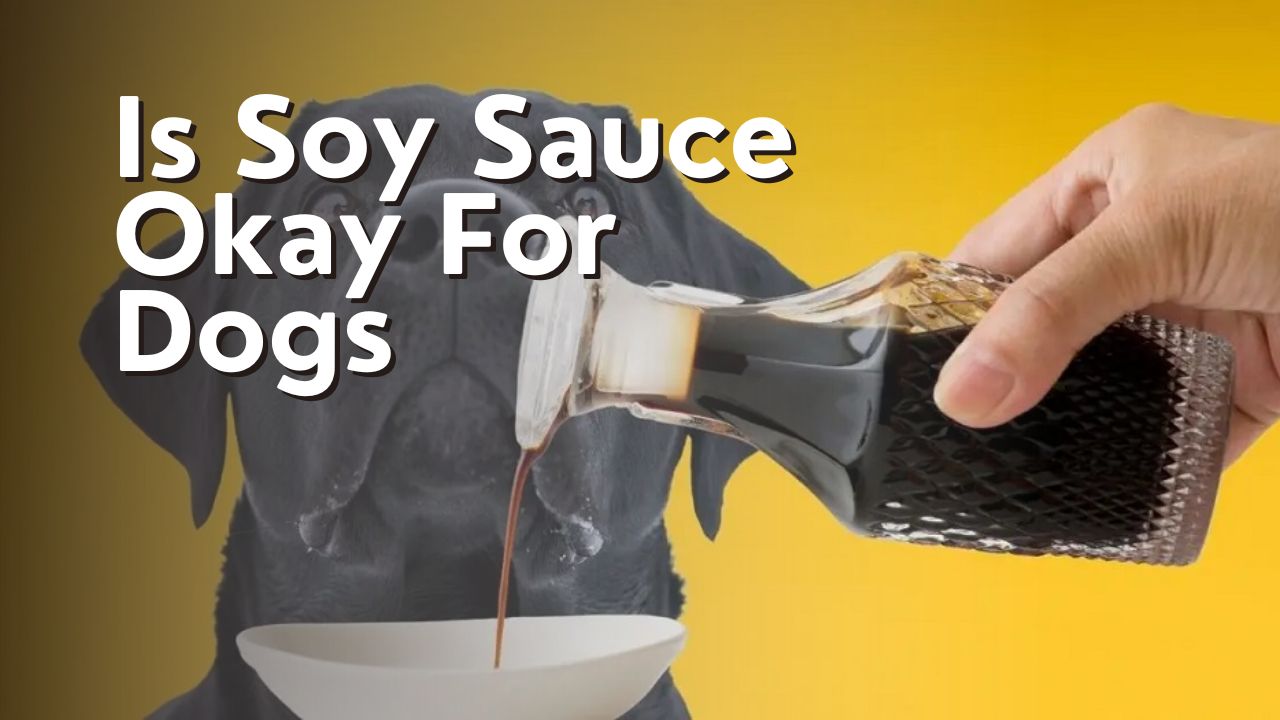Hey there, dog lovers! Today, I want to tackle a burning question that many of us have asked ourselves: is soy sauce okay for dogs? As a proud dog owner myself, I understand the importance of keeping our furry friends safe and healthy. That’s why I’ve delved into the world of soy sauce to find out if it’s a safe addition to our canine companions’ diets.
In this article, we’ll dive into the ingredients found in soy sauce and explore any potential risks it may pose to our beloved pups. We’ll also discuss the benefits of avoiding soy sauce altogether and offer some safe alternatives for adding flavor to our dog’s meals. Of course, it’s always important to consult with our trusted veterinarians for dietary advice specific to our furry friend’s needs.
So, let’s get started and find out if soy sauce is a friend or foe for our four-legged pals!
Understanding the Ingredients in Soy Sauce
You’re probably wondering what exactly is in soy sauce that could potentially harm your furry friend, right? Well, let me break it down for you.
Soy sauce is made from fermented soybeans, wheat, salt, and water. The main concern for dogs when it comes to soy sauce is the high sodium content. Dogs have different dietary needs than humans, and consuming excessive amounts of sodium can lead to health issues like dehydration, kidney problems, and even salt poisoning.
Additionally, some soy sauce brands may contain additional ingredients like garlic or onion, which are toxic to dogs. It’s important to note that even small amounts of these ingredients can be harmful to your pup.
Now, you might be wondering, ‘Can my dog have any soy sauce at all?’ Well, it’s best to err on the side of caution and avoid giving your dog any soy sauce. There are plenty of dog-friendly alternatives available that can add flavor to their meals without the potential risks. If you’re looking for a salty flavor, you can try using low-sodium chicken or beef broth as a substitute.
Always consult with your veterinarian before introducing any new foods or seasonings to your dog’s diet.
In conclusion, while soy sauce itself may not be toxic to dogs, the high sodium content and potential presence of harmful ingredients like garlic or onion make it best to avoid feeding it to your furry friend. It’s important to prioritize your dog’s health and provide them with a balanced and appropriate diet that meets their specific needs.

Potential Risks of Soy Sauce for Dogs
Unfortunately, consuming soy sauce could pose serious dangers to our furry companions.
While soy sauce may be a tasty addition to our meals, it contains high levels of sodium, which can be harmful to dogs. Sodium can lead to salt poisoning in dogs, causing symptoms like excessive thirst, vomiting, diarrhea, tremors, seizures, and even death in severe cases.
Additionally, soy sauce often contains ingredients like garlic and onion, which are toxic to dogs. These ingredients can cause damage to a dog’s red blood cells and lead to anemia.
Even small amounts of soy sauce can be problematic for dogs, so it is best to avoid feeding it to them altogether. If your dog accidentally consumes soy sauce, it is important to seek veterinary help immediately. The vet may induce vomiting or administer activated charcoal to prevent further absorption of the harmful components.
Remember, it is always better to be safe than sorry when it comes to our furry friends’ health, so it is best to keep soy sauce out of their reach and opt for dog-friendly alternatives when it comes to seasoning their meals.
The Benefits of Avoiding Soy Sauce in Your Dog’s Diet
By avoiding soy sauce in your dog’s diet, you can ensure their well-being and help them maintain a healthy and vibrant life. One of the main benefits of avoiding soy sauce is that it eliminates the risk of sodium poisoning. Excessive sodium intake can lead to symptoms such as increased thirst, vomiting, diarrhea, and even seizures or death in severe cases.
Another advantage of keeping soy sauce out of your dog’s diet is that it eliminates the risk of allergic reactions. Soy is a common allergen in dogs, and soy sauce contains soybeans. Allergic reactions can manifest as skin irritations, itching, digestive issues, and respiratory problems.
Furthermore, avoiding soy sauce also promotes a balanced and nutritious diet for your dog. Soy sauce is not a natural or necessary part of a canine’s diet. Instead, focus on providing your pup with a well-rounded meal that includes high-quality protein, healthy fats, and a variety of fruits and vegetables. This will ensure that they receive all the essential nutrients they need to thrive.
In conclusion, steering clear of soy sauce in your dog’s diet is a wise choice. It helps prevent sodium poisoning, allergic reactions, and promotes a balanced and nutritious diet. By making this small change, you can contribute to your pup’s overall well-being and ensure they live a healthy and vibrant life.
Safe Alternatives to Soy Sauce for Flavoring Your Dog’s Food
When it comes to adding flavor to your furry friend’s food, you can opt for safe alternatives that will make their meals more enjoyable. Here are four safe alternatives to soy sauce for flavoring your dog’s food:
- Broth: Adding a small amount of low-sodium chicken or beef broth to your dog’s food can enhance the taste without any harmful effects. Just make sure the broth is free from onions, garlic, and other ingredients that can be toxic to dogs.
- Pumpkin Puree: Not only is pumpkin puree a tasty addition to your dog’s meals, but it also provides added fiber and nutrients. Just be sure to use plain, unsweetened pumpkin puree without any added spices or sugars.
- Yogurt: Plain, unsweetened yogurt can be a great way to add a creamy and tangy flavor to your dog’s food. It also contains beneficial probiotics that can support their digestive health. However, be mindful of lactose intolerance in some dogs and start with small amounts to see how they tolerate it.
- Coconut Oil: Adding a small amount of coconut oil to your dog’s food can provide a rich and nutty flavor. It also offers numerous health benefits, such as improved skin and coat health. However, moderation is key, as too much coconut oil can cause digestive upset.
By choosing these safe alternatives, you can ensure that your dog’s meals are flavorful and enjoyable without the risks associated with soy sauce.
Consulting with a Veterinarian for Dietary Advice
If you want to ensure that your furry friend receives the best dietary advice, consulting with a veterinarian is like having a personal nutritionist for your dog. Veterinarians have extensive knowledge and experience in animal nutrition, making them the go-to experts for any dietary concerns you may have. When it comes to finding safe alternatives to soy sauce for flavoring your dog’s food, a veterinarian can provide valuable guidance tailored to your dog’s specific needs.
To give you an idea of the kind of advice a veterinarian can offer, here’s a table outlining some safe and healthy alternatives to soy sauce for dogs:
| Flavoring Options | Benefits | Considerations |
|---|---|---|
| Bone broth | Rich in essential nutrients | Ensure it is low in sodium |
| Pumpkin puree | High in fiber and vitamins | Use unsweetened puree |
| Plain yogurt | Provides probiotics and calcium | Choose yogurt without added sugars |
| Coconut oil | Promotes healthy skin and coat | Introduce gradually to avoid digestive upset |
By consulting with a veterinarian, you can explore these options and find the most suitable alternatives for your dog. They will take into account your dog’s age, breed, and any specific dietary restrictions or health conditions. Remember, a veterinarian’s advice is invaluable in ensuring your dog’s diet is both enjoyable and nutritious.

Frequently Asked Questions
Can soy sauce be harmful to dogs even in small quantities?
Yes, soy sauce can be harmful to dogs even in small quantities. It contains high levels of sodium, which can lead to dehydration, electrolyte imbalance, and even pancreatitis. It’s best to avoid giving soy sauce to dogs.
Are there any specific ingredients in soy sauce that are particularly dangerous for dogs?
There are specific ingredients in soy sauce that can be dangerous for dogs. High sodium content can lead to salt poisoning, and the presence of garlic or onion can cause toxicity.
Can dogs develop allergies or sensitivities to soy sauce?
Dogs can develop allergies or sensitivities to soy sauce. It’s important to be cautious and observe any adverse reactions like vomiting, diarrhea, or skin issues if you suspect your dog has a sensitivity to soy sauce.
Is there a recommended limit on how much soy sauce a dog can consume?
There is no recommended limit on how much soy sauce a dog can consume. However, it’s important to remember that soy sauce is high in sodium, so it should be given in moderation to avoid health issues.
Can soy sauce cause any long-term health issues for dogs?
Soy sauce can cause long-term health issues for dogs. It contains high levels of sodium, which can lead to dehydration, kidney problems, and even heart disease. It’s best to avoid giving soy sauce to dogs.
Conclusion
In conclusion, I’ve learned that soy sauce is not okay for dogs. It contains ingredients like sodium and soybeans that can be harmful to their health.
It’s best to avoid giving soy sauce to dogs and instead opt for safe alternatives to add flavor to their food.
Remember, it’s always important to consult with a veterinarian for dietary advice specific to your dog’s needs.
By taking these precautions, you can ensure your furry friend stays happy and healthy.


